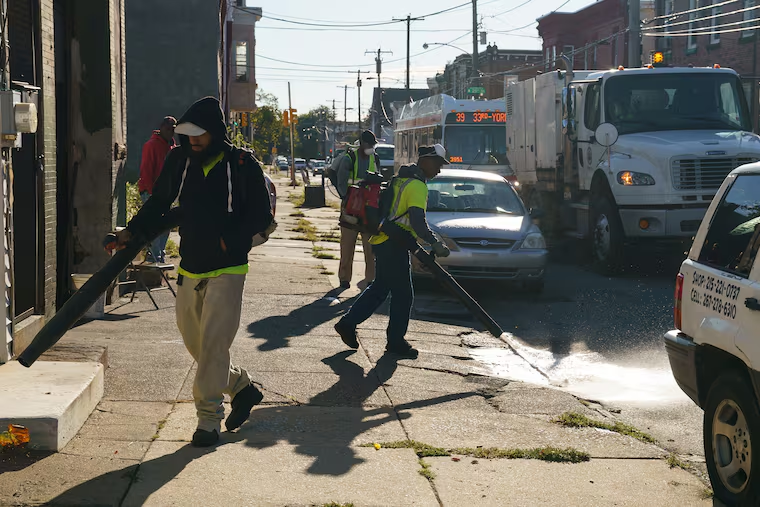Philly’s street sweeping pilot program will end this fall. Should it continue and expand?
The pilot program for residential street sweeping will end in November. Some residents like it, while others are skeptical.

Shawn Jones was chatting with a few friends outside an auto repair shop in North Philadelphia when the city’s street cleaning crew arrived.
Their conversation halted as the roar of leaf blowers came closer, blasting litter, leaves, and dust around the sidewalks. Six city workers, each with a blower, worked to move trash and debris toward the middle of the road.
A street-sweeping truck drove down York Street alongside them, spraying water and sucking up the trash blown into the street. To make way for SEPTA buses and other traffic, the truck circled several times. As the traffic passed, the litter in the street scattered, sending crew members scrambling to blow it back when the truck returned.
After the leaf blowers moved past him Friday morning, Jones said he was skeptical of the sweeping efforts.
“They just came through, and look at that,” he said, pointing to cans and potato chip bags left in the street and under cars. “It’s not sensible at all right now."
Some residents, like Jones, are uncertain about the effectiveness of the street-cleaning pilot program, which began this spring in six neighborhoods and uses leaf blowers so residents do not need to move their cars. Other residents and officials, meanwhile, are happy that Mayor Jim Kenney’s administration has brought mechanical sweeping back to some neighborhoods.
» READ MORE: Filthadelphia mapped: see how trash in your neighborhood stacks up
The pilot program will continue through November, after which city officials will decide whether to continue the sweeping and expand to other neighborhoods. The current budget includes $4.3 million for mechanical street sweeping, and $21.5 million in the five-year plan.
Kenney campaigned in 2015 on a plan to offer citywide residential street sweeping and announced the pilot program in April — a few weeks before the Democratic primary election in which he won nomination for a second term.
Six sweeping crews work in six areas of the city and clean each area weekly, the day after trash day. The neighborhoods covered are in Strawberry Mansion, Logan, Kensington, West Philadelphia, Southwest Philadelphia, and South Philadelphia.
The Kenney administration declined to comment on how successful the program has been so far. Keisha McCarty-Skelton, a spokesperson for the Streets Department, said a final report evaluating the program will be complete in December or January.
Council President Darrell L. Clarke, whose district includes some of the areas targeted in the pilot program, said he was happy that the Kenney administration found a way to bring back street sweeping.
“People were pretty excited to see the vehicles because a lot of them remember the earlier version of the street sweeping program,” Clarke said. Regular sweeping on residential streets, which required residents to move their cars, ended in 2009.
The city hired 42 employees for the pilot program; each team has six laborers and one equipment operator.
The program is focused on residential neighborhoods. Councilwoman Cherelle L. Parker introduced legislation last month that would provide regular cleaning in business corridors citywide, based on a program currently in her district. Running it citywide would cost $10 million in the current fiscal year, and Parker said she hopes that a public-private partnership could bring in some private funding as well.
“We really want to get rid of this ‘Filthadelphia’ narrative,” Parker said.
Desiree Bennett of West Cumberland Street stood on her front porch Friday and watched the sweeping crew. She said she had seen sweeping around her neighborhood in the past few months, but not yet on her street.
“I’m glad they’re coming through,” she said.
Bennett, who said she is a block captain, often cleans up after her neighbors, reminding them to bring in their trash cans and picking up bags of circulars and other items left on sidewalks.
“I was raised, getting up on a Saturday morning, cleaning your porch, picking up your trash, watering your flowers,” Bennett said.
Councilman Mark Squilla said his office received calls asking about the street cleaning when it began, because constituents wanted to know what was happening.
Now that it is underway, Squilla said, “the only responses we’ve had have been positive. It’s great to see that the city’s doing something.”
Some residents don’t agree with the use of leaf blowers, Squilla said, noting that he would be in favor of a program that involved moving cars out of the way.
Kenneth Prater of Cumberland Street said Friday was the first time he’d seen a sweeping crew on his block. He went outside to see what was going on when he heard the leaf blowers.
Prater said he was pleased to see a cleaning crew, but said Philadelphians have to do a better job of not dropping litter on the sidewalks.
“I have a tendency to do that myself,” he admitted.
Prater was so pleased to see the sweeping crew that he approached Dale Peterson, one of the city employees using a leaf blower, and asked if the crew could continue coming down his street every week.
Peterson responded: “You’d have to ask the mayor about that.”